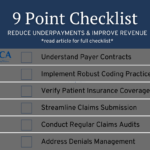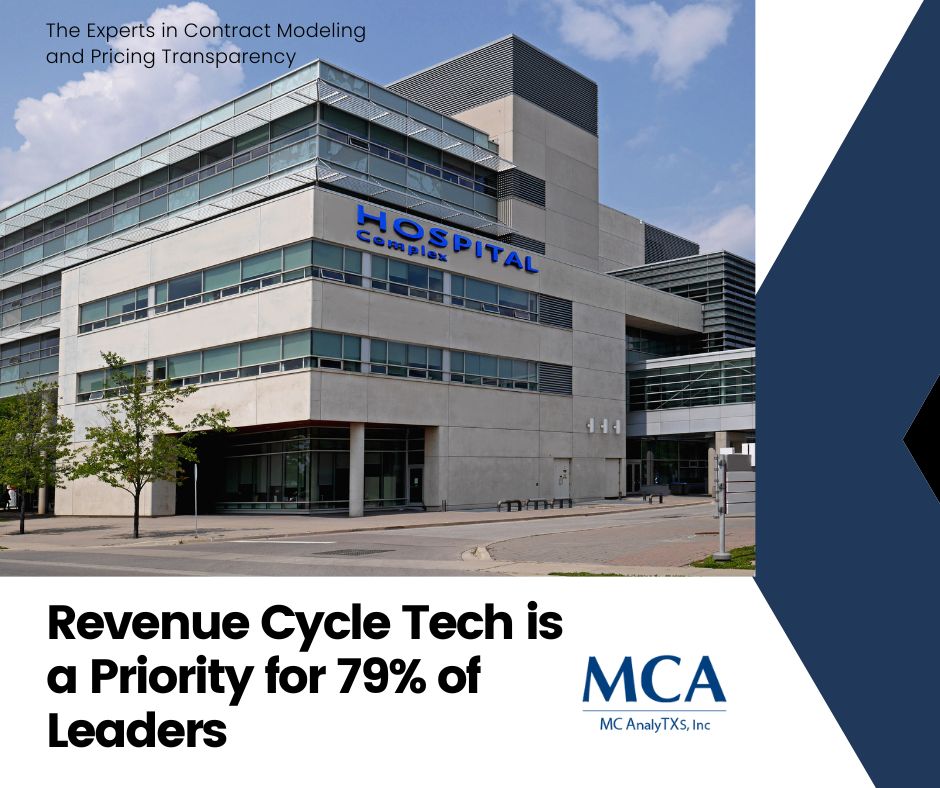
How to Set Your Healthcare Organization Up for Long-Term RCM Success
January 31, 2024
A 9-Point Checklist to Reduce Underpayments & Improve Revenue
February 5, 2024The revenue cycle in healthcare encapsulates everything from the time a patient schedules an appointment to the final payment of the balance. Recently, a whopping 79% of healthcare leaders have acknowledged the pivotal role of revenue cycle technology. Why such a staggering figure? This article unpacks the reasons for this shift, the challenges of current practices, and the transformative influence of technology on revenue cycles.
Introduction
Effective revenue cycle management (RCM) is crucial for the financial health of healthcare organizations. It ensures that providers are paid fully and promptly for the services they render. However, managing the revenue cycle has become increasingly complex, involving intricate billing procedures and compliance with various regulations.
Current Challenges in Revenue Cycle Management
The journey from patient intake to payment is fraught with challenges.
Insurance Claim Denials and Delays: A major pain point is the rejection or denial of insurance claims due to errors or miscommunication, often leading to revenue loss and delays.
Manual and Error-Prone Processes: Relying on manual processes for billing and coding is inefficient and increases the likelihood of errors that can stall the revenue cycle.
Lack of Transparency and Visibility: Without a clear view of the end-to-end process, pinpointing roadblocks or inefficiencies becomes a challenge, which can lead to slower reimbursement and reduced cash flow.
Benefits of Revenue Cycle Technology
Embracing technology can be a significant propellant for overcoming these obstacles.
Streamlined Claims Processing: With advanced software, claims are processed faster and with fewer errors, reducing denials and accelerating reimbursement.
Automated Workflows and Task Management: Automation replaces manual intervention for routine tasks, boosting efficiency and freeing up staff to focus on more complex issues.
Enhanced Data Analytics and Reporting: Leveraging data analytics can provide insightful reporting, giving leaders actionable intelligence to make informed decisions.
Improved Revenue Capture and Cash Flow: Technology ensures that capture rates are maximized, positively impacting the organization’s financial performance.
Case Studies
Many organizations are already reaping the rewards of their investment in revenue cycle technology with tangible results such as reduced days in accounts receivable, increased cash flow, and improved patient satisfaction rates. These narratives offer persuasive evidence for skeptics and a roadmap for success.
Key Considerations for Implementing Revenue Cycle Technology
Before adopting new technology, several critical factors can drastically impact the outcome.
Integration with Existing Systems: The new technology must seamlessly integrate with existing EHRs and other healthcare IT systems.
Data Security and Compliance: With stringent HIPAA regulations, ensuring patient data security and compliance is non-negotiable.
Training and Change Management: Proper training and a well-thought-out change management plan are imperative for a smooth transition to new technology.
Conclusion
The surge of interest in revenue cycle technology heralds a new era for healthcare finance. The acknowledgment by a majority of leaders emphasizes its strategic importance in a rapidly evolving healthcare landscape. As challenging as implementing new technology may seem, the potential for streamlined operations, financial gain, and enhanced patient care is too pronounced to ignore.
To remain competitive and financially healthy, healthcare organizations must align with technological advancements and modernize their revenue cycle operations. The time to prioritize revenue cycle technology is now.
To learn more join our upcoming webinar Thursday 22nd at 1 pm CST.





